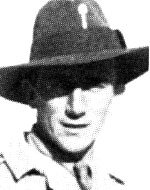Cohen, Dov (Shimshon)
Son of Sophia and Aharon-Leib, was born on December 28, 1915, in Krakow, Poland. In Poland he completed his elementary and secondary studies, which also gave him the knowledge of the Hebrew language. From his youth he was a member of the Betar youth movement and over the years served as deputy commander of the nest and commander of the first rank (young Betar) in his hometown of Horodova. In 1936 he immigrated to Israel after enrolling at the Hebrew University of Jerusalem. At the end of 1937 he continued his activities at Betar and at the height of the 1936-1939 events he enlisted in the Betar Labor Company in Nahalat Yitzhak near Jerusalem (“the company of the road”) where he served, among other places, in Notar. In December 1939 he enlisted in the British Army and was assigned to the British Expeditionary Force. He was sent to the French front and there, as part of his unit, he built a railroad extension in the Brittany region. Later he was one of the first volunteers to a combat unit that was established at the time as Commando 51. Already during the difficult training period for the commando soldiers, Dov began to stand out in his achievements. He came on a strenuous 145 km journey in 19 hours, including crossing the Suez Canal with full-length swimming, and also stood out as an excellent machine gunner with a Bren machine gun and a Thompson submachine gun, but mostly excelled as a saboteur. In the battles of the Italian commando forces on the Eritrean front, taking part in many operational operations on the Eritrean-Habash border, where the Italians tried to stop the Allied armies from attacking the steep and steep mountain, which was a key point in the entire front. In a short battle after a weary climb to the mountain, the Italian guards were killed in a surprise attack and the mountain was conquered. After the fighting ended, he was transferred to the main training camp, where he trained new recruits in order, but found no satisfaction in his job.At the end of January 1945 he went to the front of the war in Italy. In the training camp of the Brigade in Fiuggi, he stood out as an expert on mines and then took part in the last battle of the Brigade – the crossing of the Senio River – and was awarded a medal for his part in this battle. At the end of the war in Italy, Dov was one of the initiators of the establishment of a settlement nucleus for Betar soldiers and when his time came to be released, he was appointed to the Settlement Department of the Jewish Agency, and in early 1946 he renewed contact with the Irgun underground. Thanks to his combat experience, he was immediately promoted to the rank of commander, and a short while later, on the “Night of the Aircraft”, he headed the attack on the military airfield in Lod. After the success of this operation, Dov was attached to the planning division of the combat command and was given the underground name “Shimshon”. On April 2, 1946, one of the forces sent by the Irgun to sabotage the railway track in Ashdod, was found by British forces who opened fire on them and destroyed thirty-one of the thirty-three fighters. He was planning to break into the Jerusalem prison, but the implementation of the plan was postponed because the detainees were transferred to Acre prison. When the breakout was planned for Acre prison, Dov was appointed commander of the force. On 14 Iyar, May 4, 1947, they broke into the Akko prison and released forty-one Irgun and Lehi prisoners, but on the way back they encountered British soldiers returning from bathing in the sea. Nine soldiers were killed and seven others were taken prisoner, while Dov Cohen fell to the ground and was buried in the cemetery of Moshav Shavei Zion near Acre. His name was immortalized in the books “Remembering Netzach”, “Maalot”, “The Jewish Soldier on the Middle Eastern Front”, “Being a Soldier” and “Olei Hagardom”.
